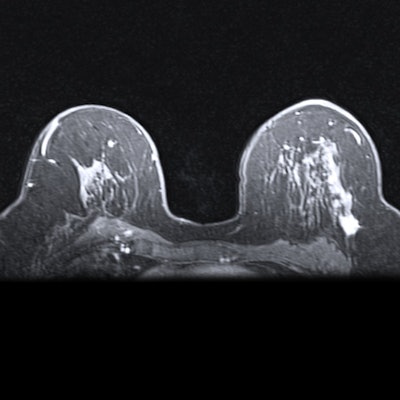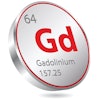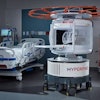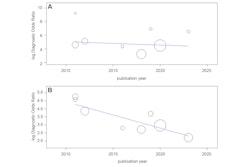
A lack of background parenchymal enhancement (BPE) suppression on contrast breast MRI during and after chemotherapy may suggest poor treatment response in hormone receptor-positive breast cancer patients, according to a study published August 24 in Radiology.
Chemotherapy for breast cancer commonly suppresses background parenchymal enhancement on breast MRI, wrote a team led by Dr. Natsuko Onishi of the University of California, San Francisco. The group investigated whether a lack of this phenomenon could indicate a poor treatment response via a study that reviewed data from 882 women treated for breast cancer with chemotherapy between May 2010 and November 2016 in the I-SPY 2 TRIAL (Investigation of Serial Studies to Predict Your Therapeutic Response with Imaging and Molecular Analysis 2).
The women underwent MRI exams before treatment, during early treatment, at midtreatment, and before surgery; their background parenchymal enhancement was measured with fibroglandular tissue segmentation. The authors evaluated any associations between the women's response to treatment and their level of background parenchymal enhancement.
Onishi and colleagues found that in hormone receptor-positive women, the association between a lack of background parenchymal enhancement inhibition and poorer treatment response was identified at the mid-treatment and before surgery timepoints, leading them to conclude that "in hormone receptor-positive breast cancer, lack of background parenchymal enhancement suppression may indicate inferior treatment response."
The results could help clinicians further refine breast cancer treatment plans, wrote Dr. Liane Philpotts of Yale School of Medicine in New Haven, CT, in an accompanying editorial.
"As another step toward more personalized medicine, the data in this study contribute to the growing realization that differences among breast cancer subtypes and among individual women require an ever-increasing variety in treatment regimens," she noted.



.fFmgij6Hin.png?auto=compress%2Cformat&fit=crop&h=100&q=70&w=100)




.fFmgij6Hin.png?auto=compress%2Cformat&fit=crop&h=167&q=70&w=250)











